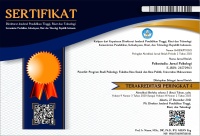Efektivitas Pelatihan ‘ASIMERU’ Sebagai Upaya Menurunkan Tingkat Burnout Guru SMPN Y Surabaya
Abstract
Burnout adalah stres berkepanjangan yang muncul karena beban pekerjaan yang berlebih. Salah satu profesi di bidang pendidikan yang mengalami burnout adalah guru di SMPN Y Surabaya. Salah satu upaya menurunkan tingkat burnout yakni melalui Pelatihan ‘ASIMERU’. Pelatihan ini berbasis penerapan Modal Psikologis yakni mengimplementasikan HERO (Hope, Self-efficacy, Resiliency & Optimism). Penelitian ini menggunakan pendekatan kuantitatif dengan metode eksperimen pretest-posttest design. Penelitian ini menggunakan teknik purposive sampling dengan jumlah 10 paritisipan. Tingkat burnout diukur dengan skala burnout oleh Maslach, Jackson, Leiter (1996) yang diberikan sebelum dan sesudah pelatihan yang kemudian dianalisis menggunakan paired sample t-test. Hasil penelitian menunjukkan bahwa Pelatihan ‘ASIMERU’ efektif untuk menurunkan tingkat burnout para guru di SMPN Y Surabaya.
Burnout is a prolonged stress arising due to an excessive workload. Teachers at Public Junior High School Y Surabaya has experienced burnout. ‘ASIMERU’ training, which is based on Psychological Capital (Hope, Self-efficacy, Resiliency & Optimism) was designed to reduce burnout rate. This study used a quantitative approach with an experimental method with a pretest-posttest design type. This study utilized a purposive sampling technique which then obtained 10 participants. The study used the burnout scale by Maslach, Jackson, Leiter (1996) given before and after training which then analyzed by using paired sample t-test. The results showed that the "ASIMERU" training was effective in reducing the burnout rate of the teachers at Public Junior High School Y Surabaya.
Keywords
Full Text:
PDFReferences
Avey, J. B., Reichard, R. J., Luthans, F., & Mhatre, K. H. (2011). Meta-Analysis of the Impact of Positive Psychological Capital on Employee Attitudes, Behaviors, and Performance. Human Resource Development Quarterly, 22(2), 127–152. https://doi.org/10.1002/hrdq
Barutçu, E., & Serinkan, C. (2013). Burnout Syndrome of Teachers: An Empirical Study in Denizli in Turkey. Procedia - Social and Behavioral Sciences, 89, 318–322. https://doi.org/10.1016/j.sbspro.2013.08.853
Coladarci, T. (1992). Teachers” sense of efficacy and commitment to teaching. Journal of Experimental Education, 60(4), 323–337. https://doi.org/10.1080/00220973.1992.9943869
Ferradás, M. del M., Freire, C., García-Bértoa, A., Núñez, J. C., & Rodríguez, S. (2019). Teacher profiles of psychological capital and their relationship with burnout. Sustainability (Switzerland), 11(18). https://doi.org/10.3390/su11185096
Hoy, A. W., Hoy, W. K., & Kurz, N. M. (2008). Teacher’s academic optimism: The development and test of a new construct. Teaching and Teacher Education, 24(4), 821–835. https://doi.org/10.1016/j.tate.2007.08.004
Kutluturkan, S., Sozeri, E., Uysal, N., & Bay, F. (2016). Resilience and burnout status among nurses working in oncology. Annals of General Psychiatry, 15(1), 1–9. https://doi.org/10.1186/s12991-016-0121-3
Psychological capital: Investion and developing positive organizational behavior. Positive organizational behavior, 9-24.
Mayers, A. (2013). Introduction to Statistics and SPSS in Psychology. London: Pearson Education Limited.
Nur, M., Harun, C. Z., & Ibrahim, S. (2016). Manajemen Sekolah Dalam Meningkatkan Mutu Pendidikan Pada Sdn Dayah Guci Kabupaten Pidie. None, 4(1), 93–103.
Rasyid, M., Rahmah, D. D. N., & Permatasari, R. F. (2021). Teacher’s Academic Optimism dalam Menghadapi Proses Belajar Mengajar Daring Selama Masa Pandemi Covid-19. Psikostudia : Jurnal Psikologi, 10(1), 90. https://doi.org/10.30872/psikostudia.v10i1.5479
Rehman, S. ur, Qingren, C., Latif, Y., & Iqbal, P. (2017). Impact of psychological capital on occupational burnout and performance of faculty members. International Journal of Educational Management, 31(4), 455–469. https://doi.org/10.1108/IJEM-01-2016-0011
Schulz, S. A., Luthans, K. W., & Messersmith, J. G. (2014). Psychological capital: A new tool for driver retention. International Journal of Physical Distribution and Logistics Management, 44(September), 621–634. https://doi.org/10.1108/IJPDLM-06-2013-0174
Sokmen, Y., & Kilic, D. (2019). The relationship between primary school teachers’ self-efficacy, autonomy, job satisfaction, teacher engagement and burnout: A model development study. International Journal of Research in Education and Science, 5(2), 709–721.
Taku, K. (2014). Relationships among perceived psychological growth, resilience and burnout in physicians. Personality and Individual Differences, 59, 120–123. https://doi.org/10.1016/j.paid.2013.11.003
DOI: http://dx.doi.org/10.30872/psikostudia.v10i3.5621
Refbacks
- There are currently no refbacks.
Copyright (c) 2021 Psikostudia : Jurnal Psikologi

This work is licensed under a Creative Commons Attribution-ShareAlike 4.0 International License.
Indexing by :
_________________________________________
PSIKOSTUDIA: Jurnal Psikologi Published by Faculty of Social and Political Siences, University of Mulawarman, Samarinda, East Kalimantan and This work is licensed under a Creative Commons Attribution-ShareAlike 4.0 International License.
_________________________________________
PSIKOSTUDIA: Jurnal Psikologi
Department of Psychology
Faculty of Social and Political Siences, University of Mulawarman
Jl. Muara Muntai Kampus Gn. Kelua Samarinda 75411
Phone: +62 813 35350368
E-Mail: psikostudia@fisip.unmul.ac.id




















